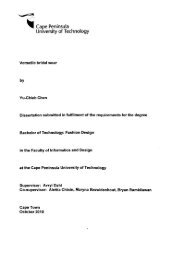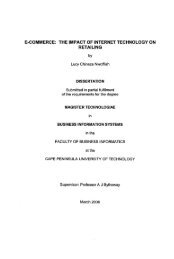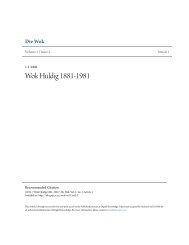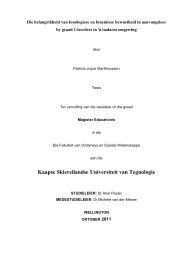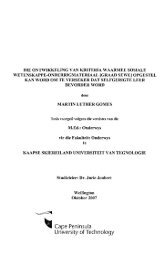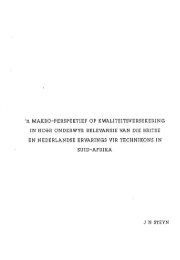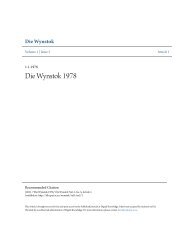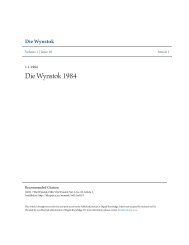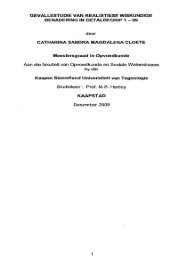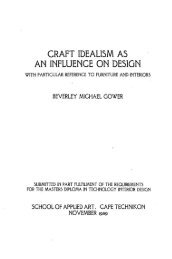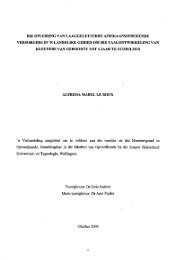an investigative analysis of the psychological characteristics and job ...
an investigative analysis of the psychological characteristics and job ...
an investigative analysis of the psychological characteristics and job ...
Create successful ePaper yourself
Turn your PDF publications into a flip-book with our unique Google optimized e-Paper software.
CHAPTER ONE<br />
FORMULATION OF THE RESEARCH PROBLEM AND OBJECTIVES<br />
1.1 INTRODUCTION<br />
CThe knowledge-based economy is having a pr<strong>of</strong>ound impact on all societies, including that <strong>of</strong><br />
South Africa This development is <strong>of</strong> signific<strong>an</strong>ce for <strong>the</strong> higher education sector in South Africa<br />
because it has to adapt to related educational needs. The capacity <strong>of</strong> South Africa to adopt<br />
disseminate <strong>an</strong>d maximise rapid technological adv<strong>an</strong>ces is dependent on <strong>an</strong> adequate system <strong>of</strong><br />
tertiary or higher educationJ<br />
ISince April 1994 a new approach to education <strong>an</strong>d training has been launched in South Africa<br />
when <strong>the</strong> policy <strong>of</strong> outcomes-based education <strong>an</strong>d training was adopted. This policy promotes <strong>the</strong><br />
idea that students should be critical <strong>an</strong>d creative thinkers, which is in contrast with <strong>the</strong> previous<br />
educational approach, which was content-focused. In outcomes-based training it is import<strong>an</strong>t that<br />
<strong>the</strong> leamer underst<strong>an</strong>ds <strong>an</strong>d tr<strong>an</strong>sfers newly acquired knowledge <strong>an</strong>d skills in different situations<br />
(Basson, Rothm<strong>an</strong>, Steyn &Rothm<strong>an</strong>, 2001: 27).<br />
No o<strong>the</strong>r sub-system <strong>of</strong> education plays as import<strong>an</strong>t a role as co-operative education in <strong>the</strong><br />
development <strong>of</strong> leamers' critical <strong>an</strong>d creative thinking skills in <strong>the</strong> different work situations <strong>the</strong>y will<br />
find <strong>the</strong>mselves. Certainly one <strong>of</strong> <strong>the</strong> foundational cornerstones <strong>of</strong> <strong>the</strong> co-operative education<br />
concept is <strong>the</strong> role that <strong>the</strong> Co-operative Education lecturer (CEl) plays.<br />
The pr<strong>of</strong>ile <strong>of</strong> a CEl entails, inter alia, <strong>the</strong> <strong>psychological</strong> <strong>characteristics</strong> <strong>an</strong>d <strong>job</strong> specifications <strong>of</strong><br />
such aperson.<br />
Hays (1994:31) notes that <strong>the</strong> world has ch<strong>an</strong>ged dramatically, presenting co-op practitioners <strong>an</strong>d<br />
administrators with new problems <strong>an</strong>d opportunities. Hartley (1988:31) is <strong>of</strong> <strong>the</strong> same opinion when<br />
he states that educators will face <strong>an</strong> ever-increasing m<strong>an</strong>date to develop <strong>an</strong>d refine models that<br />
more adequately serve <strong>the</strong> needs <strong>of</strong> <strong>the</strong> rising number <strong>of</strong> non-traditional students who will be<br />
entering colleges <strong>an</strong>d universities (e.g., minorities, <strong>the</strong> h<strong>an</strong>dicapped, older adults <strong>an</strong>d foreign




